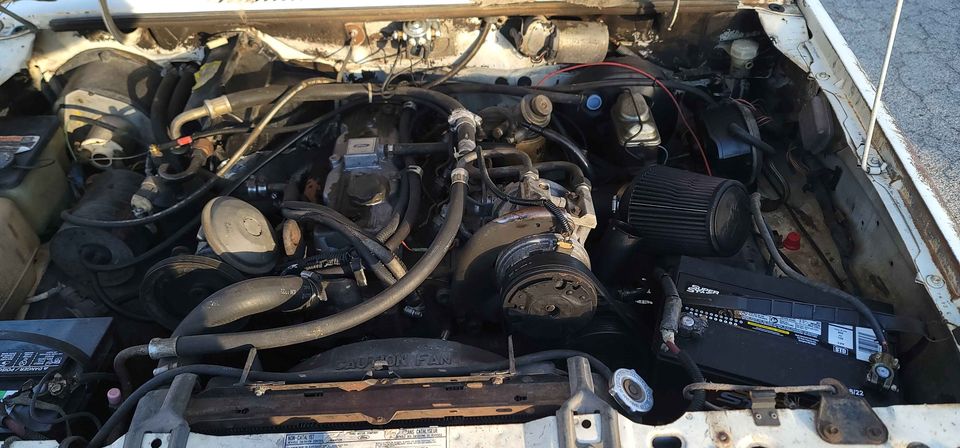How to Maintain and Optimize the 2.2 Ford Ranger Engine for Long-Lasting Performance
How to Maintain and Optimize the 2.2 Ford Ranger Engine for Long-Lasting Performance
Blog Article
What Makes a Car Engine Run Efficiently: Leading Tips for Ideal Care
The smooth operation of a vehicle engine is essential to both efficiency and long life, making optimal care a necessary responsibility for lorry owners. What specific actions should you focus on to guarantee your engine continues to be in peak problem?
Normal Oil Modifications
One of the most essential aspects of car maintenance is guaranteeing your engine gets routine oil modifications. Engine oil lubricates internal elements, reduces rubbing, and aids preserve optimal operating temperatures. Over time, oil deteriorates due to warmth, impurities, and the all-natural by-products of combustion, bring about decreased efficiency and possible engine damage.
Most suppliers suggest changing the oil every 5,000 to 7,500 miles, yet this period can vary based upon driving conditions and oil kind. For example, synthetic oils may enable longer periods in between adjustments. Routine oil modifications not only enhance engine efficiency but additionally enhance fuel effectiveness, as tidy oil advertises smoother operation.
Neglecting oil modifications can cause sludge buildup, which impairs blood circulation and can cause serious engine problems. It is crucial to inspect oil degrees consistently and keep track of for any type of unusual modifications in color or uniformity, which can show contamination or deterioration.

Keeping Coolant Degrees
Maintaining proper coolant levels is crucial for avoiding engine getting too hot and ensuring ideal efficiency. The coolant, typically a mix of water and antifreeze, distributes via the engine, taking in warmth and avoiding thermal tension. Inadequate coolant can bring about enhanced engine temperature levels, which might cause serious damage and even complete engine failure.
To keep optimal coolant degrees, regularly evaluate the coolant storage tank, usually located in the engine bay. Make certain the coolant is filled to the suggested mark, as indicated in your automobile's proprietor manual. It is advisable to inspect the levels at the very least as soon as a month or eventually journeys, particularly throughout severe weather condition problems.
If you notice that the coolant level is regularly low, there may be a leak in the air conditioning system, which need to be addressed promptly to avoid further issues. 2.2 ford ranger engine. In addition, flushing the coolant system every a couple of years can help get rid of any accumulated debris and guarantee effective warmth exchange
Monitoring Air Filters

It is recommended to check the air filter every 12,000 to 15,000 miles, or extra regularly if driving in unfavorable or dirty conditions. A basic aesthetic examination can typically disclose whether the filter is dirty or damaged. It should be replaced without delay. if the filter shows up stained or has visible dirt buildup.
Using a high-grade air filter designed for your certain lorry model can better enhance engine efficiency. Additionally, some vehicles may gain from multiple-use filters that can be cleansed and re-installed, offering a eco friendly and cost-efficient option.
Inspecting Glow Plugs
Flicker plugs are vital parts of a car's ignition system, straight impacting engine efficiency and effectiveness. They create the trigger that fires up the air-fuel combination in the combustion chamber, facilitating the engine's power generation. Routine inspection of ignition system is critical for keeping optimal engine function and stopping potential concerns.
During an assessment, search for indicators of wear or damage, such as fractures, carbon accumulation, or too much space widening. A healthy ignition system typically exhibits a light brownish or tan color. Dark soot or oil down payments can suggest inappropriate combustion, while a white or blistered appearance might recommend overheating. Both problems need immediate focus to stop further engine damages.
It's recommended to inspect ignition system every 30,000 miles, or as suggested in your vehicle's proprietor manual. Furthermore, consider changing them according to the maker's guidelines, as old or used ignition system can cause misfires, reduced gas effectiveness, and enhanced emissions.
Surveillance Tire Pressure
Under-inflated tires can lead to lowered fuel effectiveness, increased tire wear, and jeopardized handling. Regular surveillance of tire stress is essential for ideal vehicle procedure.
Tire stress should be checked at the very least when a month and eventually journeys. Use a trusted tire pressure scale to measure the pressure when the tires are cool, ideally prior to the lorry has been driven for at the very least three hours. Refer to the automobile's owner manual or the placard situated on the motorist's side door jamb for the producer's advised pressure levels.
It is essential to keep in mind that tire pressure can vary with modifications in temperature; a decline of 10 ° F can result in a 1-2 psi reduction in pressure. Furthermore, aesthetically examine tires for any type of indicators of wear or damages during your tracking regimen. Keeping appropriate tire stress not just improves vehicle safety and security yet additionally boosts gas performance and prolongs tire life, eventually adding to a smoother engine efficiency.
Final Thought
In conclusion, keeping a cars and truck Website engine's smooth procedure requires attentive attention to a number of essential factors. Ultimately, a positive method to engine care is crucial for ensuring integrity and capability over time.
One of the most crucial aspects of cars and truck maintenance is ensuring your engine receives regular oil adjustments. Engine oil lubes inner components, reduces friction, and aids keep ideal operating temperatures. Normal oil More Help changes not just boost engine efficiency yet additionally boost gas performance, as tidy oil promotes smoother operation.
Insufficient coolant can lead to raised engine temperature levels, which might trigger severe damages or also complete engine failing.

Report this page